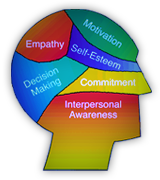
Your emotional intelligence is the ability to sense, understand, control, and express emotions to improve your work or the work you do with others.
The two main areas of emotional intelligence are Intrapersonal and Interpersonal.
Intrapersonal is what you experience inwardly when facing daily events.
Interpersonal is what you experience outwardly between yourself and other people.
Research shows that exceptional performers and top leaders possess well developed emotional intelligence skills. This enables them to work well with many types of people and handle a variety of situations. This is essential to business success with the ever-changing needs of society. As a matter of fact, your emotional intelligence may be a better predictor for the success of your career than your IQ is.
There are five dimensions of emotional intelligence, three within the area of Intrapersonal Emotional Intelligence and two within the area of Interpersonal Emotional Intelligence:
Intrapersonal Emotional Intelligence Dimensions:
Self-Awareness is the capability to identify and comprehend your emotions, moods, and what drives you; in addition to how they affect others.
Examples of Self-Awareness:
- Understanding how your emotions impact your goals, motivations, strengths and key aspirations.
- Recognition of how emotions can impact the understanding of the feedback you receive from others.
- The capability to project confidence in most situations.
- The ability to understand your emotions and their impact on stress.
Self-Regulation is the power to control or modify your urges and moods and the inclination to delay the decision to think before you do something.
Examples of Self-Regulation:
- The ability to manage emotional impact when dealing with conflict.
- Thinking things through from an emotional perspective before acting.
- Being able to effectively manage your emotions when resolving issues in most cases
of conflict. - The ability to lift yourself out of a bad mood.
Motivation is a passion to work for reasons that go beyond money or status and a propensity to pursue goals with energy and persistence.
Examples of Motivation:
- Pursuing your goals with enthusiasm and energy.
- Continuously looking for ways to succeed when faced with challenges or resistance.
- Looking for ways to develop your skills or improve your career when you see the need.
- The tendency to meet your goals and the expectations others set for you.
Interpersonal Emotional Intelligence Dimensions:
Empathy is your ability to understand the emotional makeup of other people.
Examples of Empathy:
- Recognizing if you have potentially offended someone, and making efforts to avoid that in the future.
- When using active listening skills, you are able to predict a person’s emotional state.
- Others tend to feel you are compassionate towards them.
- Even though you have a strong opinion on something, you are still able to understand others’ perspectives.
Social Skills is a proficiency in managing relationships and building networks.
Examples of Social Skills:
- Others generally find spending time with you a positive experience.
- Interpreting nonverbal cues in most instances.
- Negotiating with others.
- Placing value on friendships.
In business, it is vital to make sure that you have the right combination of emotional behaviors for the position you want. The good thing about your Emotional Quotient is that you can learn to control or change behaviors as needed. While your personality can be extremely difficult to change, your emotions can be trained through better habits.
The (EQ) Emotional Quotient Assessment is a great tool to find out what behaviors comprise your emotional quotient, and how you can improve upon them. This assessment is often mistakenly referred to as an emotional quotient test but it contains no right or wrong answers, just perceptions of your emotional intelligence quotient based on your responses.
The EQ Assessment is extremely valuable to employers who are looking to find quality long-term employees. Since employees with a high emotional quotient work best with a variety of people, they can often cover and assist other employees at different levels when needed.
Call or Email Holt Management and Consulting for more information the EQ Assessment as well as other assessments that can supercharge your recruiting efforts!



